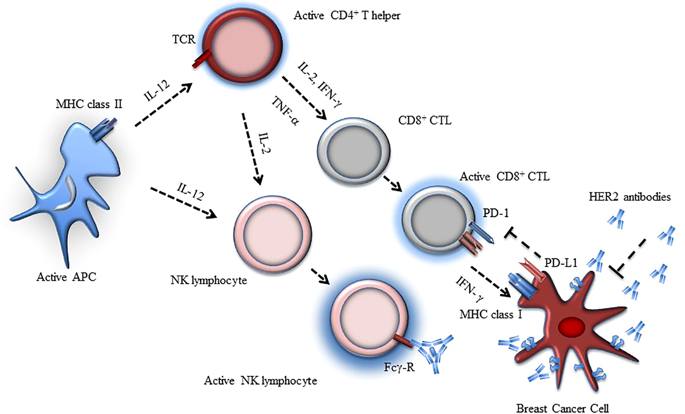npj Breast Cancer ( IF 6.5 ) Pub Date : 2020-03-12 , DOI: 10.1038/s41523-020-0153-3 Ricardo L B Costa 1 , Brian J Czerniecki 1

|
Human epidermal growth factor receptor 2–positive (HER2+) breast cancer accounts for ~25% of breast cancer cases. Monoclonal antibodies (mAbs) against HER2 have led to unparalleled clinical benefit for a subset of patients with HER2+ breast cancer. In this narrative review, we summarize advances in the understanding of immune system interactions, examine clinical developments, and suggest rationales for future investigation of immunotherapies for HER2+ breast cancer. Complex interactions have been found between different branches of the immune system, HER2+ breast cancer, and targeted treatments (approved and under investigation). A new wave of immunotherapies, such as novel HER2-directed mAbs, antibody drug conjugates, vaccines, and adoptive T-cell therapies, are being studied in a broad population of patients with HER2-expressing tumors. The development of immunotherapies for HER2+ breast cancer represents an evolving field that should take into account interactions between different components of the immune system.
中文翻译:

HER2 + 乳腺癌免疫疗法的临床开发:针对 HER2 的单克隆抗体及其他药物的回顾
人表皮生长因子受体 2 阳性 (HER2 + ) 乳腺癌约占乳腺癌病例的 25%。针对 HER2 的单克隆抗体 (mAb) 为部分 HER2 +乳腺癌患者带来了无与伦比的临床益处。在这篇叙述性综述中,我们总结了对免疫系统相互作用的理解进展,检查了临床发展,并为 HER2 +乳腺癌免疫疗法的未来研究提出了理由。免疫系统不同分支之间存在复杂的相互作用,HER2 +乳腺癌和靶向治疗(已批准和正在研究中)。新一波的免疫疗法,例如新型 HER2 定向单克隆抗体、抗体药物偶联物、疫苗和过继性 T 细胞疗法,正在广泛的 HER2 表达肿瘤患者群体中进行研究。HER2 +乳腺癌免疫疗法的开发代表了一个不断发展的领域,应考虑免疫系统不同组成部分之间的相互作用。






























 京公网安备 11010802027423号
京公网安备 11010802027423号